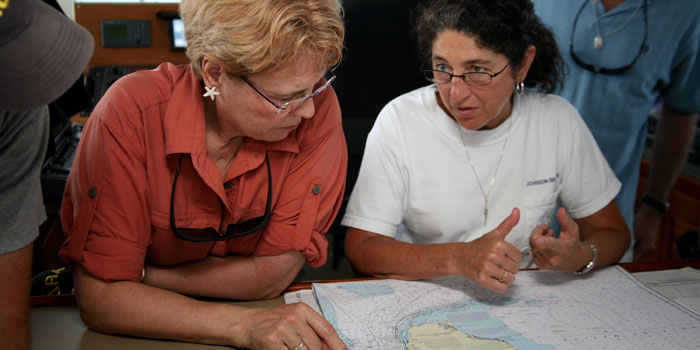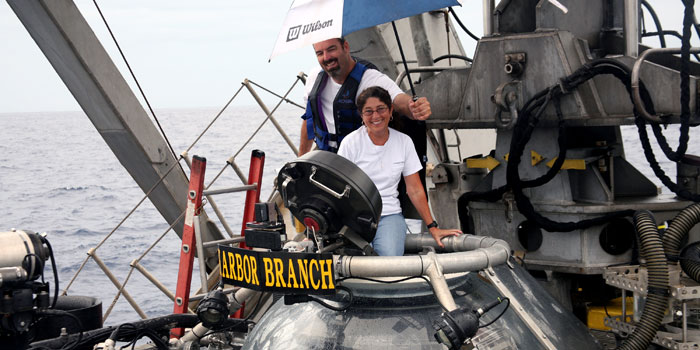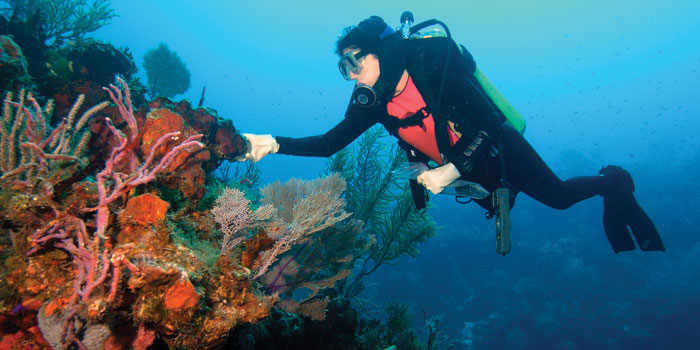Shirley A. Pomponi: Video Transcript
Hear Shirley A. Pomponi talk about her job. Download (mp4, 102 MB).
Introduction
I’m Shirley Pomponi and I am vice president and director of research at Harbor Branch Oceanographic Institution, which is a non profit research institution in Fort Pierce, Florida; which is on the southeast coast of Florida.
My job is actually very diverse. I’m involved in institutional management. I direct the areas of research that are going on at Harvard Branch. We have a very broad research program. I do get to go out in the field, so I will go out on our ships about six weeks out of every year. This is probably my favorite part of my job.
For the past eighteen years, I’ve been involved in a marine natural products drug discovery program. We are looking for marine plants and animals that produce chemicals that can be developed into drugs to treat human diseases. I feel this is a way that I can combine my educational experience in biological oceanography and marine biology, with an interest in medicine and pharmacology.
The process by which we look for drugs is we go out and use our ships and submersibles. We go down to about 3000 feet or if it is shallower than that we can even use scuba diving. We collect samples. Our samples are primarily invertebrates, like sponges and seafans. We take them back to the lab and grind them up and make what we call an extract. We test that extract which has many common chemicals in it. For example, to see if it will kill cancer cells. If it will, our chemists figure out which single chemical in that extract is responsible for that activity. We have actually discovered many chemicals that have potential for the treatment of cancer, inflammatory diseases, or infectious diseases. We’ve patented these discoveries and we have been fortunate enough to license one of our discoveries to a pharmaceutical company. It is in development right now to treat cancer; so it’s on it’s way to the clinic. We’re really excited about that.

"I was lucky enough to be able to combine both my interests, marine science and pharmacology in my career."
Background
When I was a sophomore in college, I changed my career focus, which up until that point had been to go into direct discovery research, believe it or not, but it was more from a medical angle than an oceanographic angle. In the summer between my sophomore and junior years in college I had the opportunity to take a course in marine ecology in St. Croix, and at that point I decide I wanted to go into marine science. It was only later, probably about ten years later, that I was lucky enough to be able to combine both my interests, marine science and pharmacology in my career, so I consider myself very lucky.
Because of the level of management and administration I’m doing, and project coordination, it requires a Ph.D. However, we have people working in marine science with associate degrees all the way up to Ph.Ds, and they’re all doing laboratory work as well. So you don’t have to have a Ph.D. to do some exciting laboratory work.
Probably if I had some background in concepts of teaching, I think that someone with my experience could also do a good job at teaching students, particularly in ocean sciences.
I wish that I had taken more chemistry courses and at the time I was in school, molecular biology was really just starting. So I really wish now, if I had the opportunity to go back and spend a year in school, I would take some biochemistry and molecular biology. I’ve taken some short courses in that, but I really feel like I could use more background in those courses.

"Probably the most fascinating part of my job is being able to go in the submersibles."
Job Description
Probably the most fascinating part of my job is being able to go in the submersibles. We have three submersibles at Harbor Branch. To be able to go in the submersibles and really see organisms that live down deep. We can go as deep as three thousand feet and on practically every single dive I’ve seen something unique. And it’s different from what you seen in books. You can look at something in a book and say “Oh, this is what it really looks like underwater,” so that definitely is the most fascinating part of my job.
Those at the starting end of marine science, like lab technicians, are making somewhere around twenty one to twenty five thousand dollars. As you move up the track and you’re doing more management of projects and so on, it can be closer to like seventy five or one hundred thousand and when you get even higher up in terms of institutional management it could be over one hundred and fifty thousand dollars.
One of the best parts of my job is I get to travel. It takes a certain personality to accept that because I travel alot and that doesn’t always mesh wth peoples lifestyles. I travel alot right now for meetings particularly to determine how oceanographic research is going on in the United States. I travel alot attending those meetings. I also travel about six weeks out of each year to do field work. I get to go all over the world. Most of my travel in in the United States but I also travel to Europe, the Far East, Australia, and New Zealand. I’m very, very lucky and I’ve seen a lot of things. For the past eighteen year the work that I’ve done is in the discovery of marine natual products that could be developed into drugs. It would affect people if one of our compounds makes it to the clinic and it could be used as a drug to treat cancer. So that is very satisfying.

"Dr. Pomponi: on a personal note..."
Personal Note
I like to read. I like to rollerblade and bike and do outdoor activities. I like to go to the beach. Those are this things I like to do when I’m not working. I never anticipated at the time that I was in gradutae school or even in college that I would be doing today what I am doing. I thought that I’d have a career in marine science and earlier than that I thought I’d have a career in medical research. I never guessed that I would be able to combine the two, nor did I ever think that I would get this far along in terms of institutional management and being involved in the development of programs at the national level. It’s been a series of nice surprises and I really enjoy my job.
Return to profile